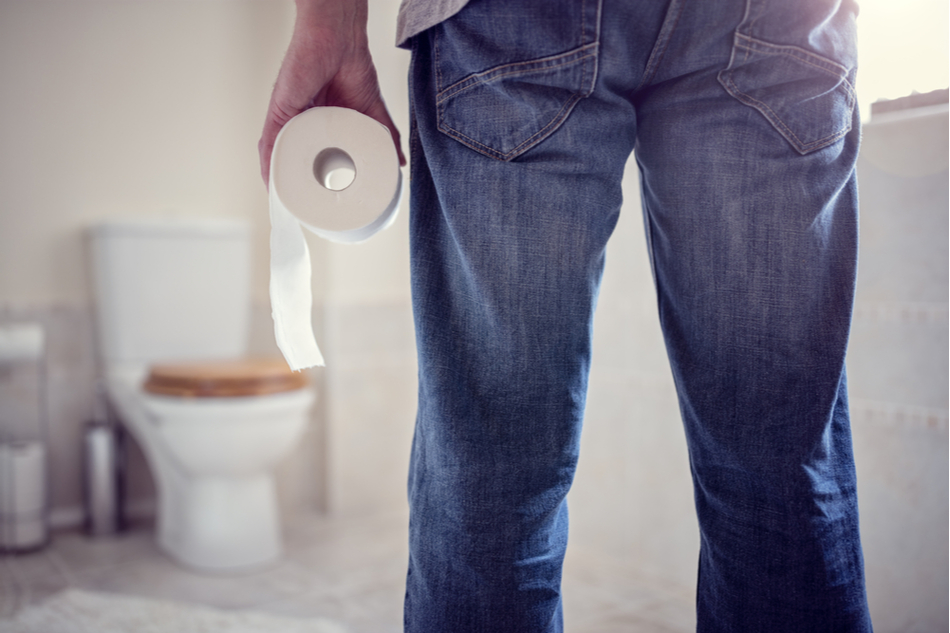When thinking about what self-care looks like, our minds likely go to indulgent baths, practicing yoga, or setting aside time to journal—and while these are all components of self-care, there’s one important part of self-care that we may not like to dwell on: our bowel movements.
Though we may not bring up the topic of our poop schedules when guests ask us how we practice self-care over dinner, maintaining regular bowel movements is a crucial part of caring for our health. Since every individual is unique, there’s no true standard for a healthy poop schedule. According to the Mayo Clinic, anything between three times a day and three times a week could be considered normal. That said, if you know what your normal looks and feels like and have started to notice that things are a bit “off schedule,” there are some expert-recommended things you should eat, drink, and do to get yourself back on track.
Focus on your food and water intake
Water and fiber are key elements for maintaining regular bowel movements. According to Erin Lisemby Judge, RDN, the owner of gut health-focused dietetics practice Gutivate, “Water keeps your stool soft and your gut muscles healthy which is essential to pooping.” Soluble fiber and insoluble fiber, on the other hand, help form stool that can move easily through your intestines.
Carrots, apples, beans, and barley are good sources of soluble fiber, which breaks down into a gel-like substance, and insoluble fiber, like whole wheat flour, oats, sweet potatoes, and cauliflower, don’t break down but instead solidify and bulk up the stool. While both types of fiber are important, insoluble fiber is what people rely on to encourage their movements or to relieve constipation.
Prebiotics (plant fiber that supports the “good” bacteria in your gut microbiome) are essential in the brain-gut neural pathways that control digestion and defecation. You can fuel your body with berries, citrus fruit, melon, leafy green veggies, root veggies, and legumes, nuts, and seeds, all of which are rich in prebiotic fiber.
“It’s also recommended that you consume fermented foods like yogurt, miso, kefir, kombucha, and sauerkraut,” says Rachel Larkey, MS, RD, CDN, CLC. Even though these don’t have fiber, they also add to the good bacteria in your gut microbiome.
Both Larkey and Judge also stress the importance of drinking enough water throughout the day, which will help optimize stool consistency and help muscles function the way they’re meant to.
Try to stick to a meal and sleep schedule
Maintaining a regular meal and sleep schedule will help your body adjust to a routine which will, in turn, encourage your poop schedule to normalize. Just be sure that you’re consistently eating fiber-rich meals, drinking water, and sleeping enough.
Judge even recommends trying “toilet time,” at the same time every day. “This means you sit on the toilet for five minutes around the same time each day to train your body that this is the time to relax and poop,” she explains. You’ll probably be more successful if you do this after drinking a big glass of water, a cup of coffee, or eating your first meal. If you don’t accomplish what you’re trying to accomplish within five minutes, then just try again later.
Pay attention to digestive irritants
There are some things that we may really want to snack on or drink, even knowing that they will interrupt our digestive cycles. “For example, alcohol can interfere as a gut irritant,” says Judge. “Caffeine and coffee can also speed your gut up and throw off your schedule.”
Everyone will respond differently to different things though, so it’s important to take note of how you’re feeling.
Reach out to your doctor if you suspect something is wrong
If you’re following all these guidelines and you still feel as though there’s something wrong, then don’t wait to call your doctor. If you haven’t pooped in a few days, or are experiencing abdominal cramping or loose, water, black, or bloody stool, then you may require medical attention.












